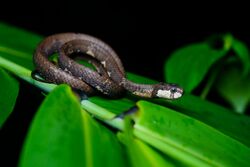Biology:Aplopeltura
| Aplopeltura | |
|---|---|

| |
| Aplopeltura boa, Khao Luang National Park. | |
| Scientific classification | |
| Domain: | Eukaryota |
| Kingdom: | Animalia |
| Phylum: | Chordata |
| Class: | Reptilia |
| Order: | Squamata |
| Suborder: | Serpentes |
| Family: | Pareidae |
| Genus: | Aplopeltura Duméril, 1853[3] |
| Species: | A. boa
|
| Binomial name | |
| Aplopeltura boa Boie, 1828[2]
| |
Aplopeltura is a genus of snakes of the family Pareidae. It contains a single species, Aplopeltura boa, the blunthead slug snake or blunt-headed slug-eating snake.[1][2] It is a small, non-venomous snake. The species can be found in southern Thailand, Malaysia, Indonesia, Brunei and the Philippines .[1]
A. boa eats mainly snails, especially operculate species. Their jaws are more mobile than those of most other vertebrates. With their mandibles, they cut the operculum off from their prey with a unique "sawing" motion. [4]
A. boa has been observed performing simple death feigning behavior. The snake rolls itself into a spiral with its belly up, staying still until the threat leaves. Unlike other death feigning snakes, A. boa does not emit a foul odor or open its mouth. [5]
References
- ↑ 1.0 1.1 1.2 Grismer, L.; Diesmos, A.C.; Gonzalez, J.C.; Jose, R.; Inger, R.F. (2012). "Aplopeltura boa". The IUCN Red List of Threatened Species (IUCN) 2012: e.T176342A1440473. doi:10.2305/IUCN.UK.2012-1.RLTS.T176342A1440473.en. http://www.iucnredlist.org/details/176342/0. Retrieved 27 December 2017.
- ↑ 2.0 2.1 Aplopeltura at the Reptarium.cz Reptile Database. Accessed 20 May 2016.
- ↑ Duméril (1853). Prodrome de la classification des reptiles ophidiens, page 67.
- ↑ Kojima, Yosuke (2020). "Mandibular sawing in a snail-eating snake". Scientific Reports 10 (1): 12670. doi:10.1038/s41598-020-69436-7. PMID 32728121. Bibcode: 2020NatSR..1012670K.
- ↑ Jablonski, Daniel. "Death feigning behaviour in Aplopeltura boa". Natural History Note. https://www.researchgate.net/publication/305266212.
Wikidata ☰ {{{from}}} entry
 |



